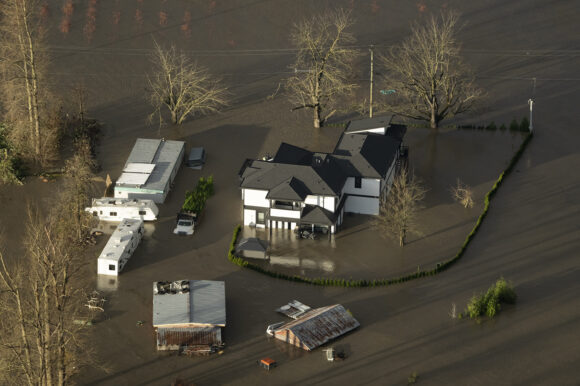CALGARY, Alberta — Energy infrastructure companies were scrambling on Wednesday to restore pipelines in British Columbia that were shut down by catastrophic flooding, as natural gas prices in the region spiked higher and fears of gasoline shortages grew.
Canada’s westernmost province declared a state of emergency after a phenomenon known as an atmospheric river dumped a month’s worth of rain in two days, with one death confirmed after mudslides destroyed roads and left several mountain towns isolated.
Natural gas customers in the lower mainland of British Columbia and the Pacific Northwest are facing reduced supplies after Enbridge Inc shut a segment of its Westcoast pipeline on Tuesday as a precaution, reducing flows to 1.4 billion cubic feet a day (bcf/d) from up to 1.8 bcf/day normally.
The Trans Mountain oil pipeline, which ships 300,000 barrel per day of crude and refined products from Alberta to Burnaby, near Vancouver, also shut down entirely on Sunday.
Next-day natural gas prices at the Northwest Sumas hub at the Washington-British Columbia border jumped about 38% on Wednesday to their highest since late October. That was the biggest daily percentage gain at Sumas since February’s freeze left millions without power in Texas.
The Westcoast pipeline is the main conduit for deliveries to the area from northern British Columbia’s gas-producing region. Analysts said the severity of the impact would depend on the duration of the interruption.
“With the start of the winter heating season and higher demand, this is a bigger concern than it would have been in the summer,” said Martin King, an analyst with RBN Energy.
FortisBC, which serves around 1.2 million customers in the province, said it is still getting enough gas from the Westcoast pipeline to meet its needs and also has gas in storage.
However, about 1,200 customers in Princeton are without gas because of damage to infrastructure and repairs could take a couple of days, spokeswoman Diana Sorace said.
A concern for western Canadian producers is that gas supplies could start backing up into the Station 2 and AECO storage hubs in northern British Columbia and Alberta, which may drive down prices, said Wood Mackenzie analyst Dulles Wang.
Multiple crews are working to assess the pipeline segments affected by the flooding but it may take several days, Enbridge said in a notice posted to the Westcoast website on Wednesday.
Trans Mountain, which is owned by the Canadian government, is also working on plans to restart its pipeline and completed an initial assessment by air, the operator said in a statement.
The lower mainland sources more than 80% of its gasoline from refineries in Alberta or the 55,000 barrel per day Parkland Corp refinery in Burnaby, which processes crude shipped on Trans Mountain, said Kent Fellows, a professor at the University of Calgary’s School of Public Policy.
“With rail and the pipeline shut down that’s taking the majority of their gasoline supply offline,” Fellows said. “If that pipeline is down for a while this will become a really big problem for the lower mainland and Vancouver Island.”
The Parkland Refinery did not immediately respond to a request for comment.
About the photo: Flood waters surround a home in Abbotsford, British Columbia, Tuesday, Nov. 16, 2021. (Jonathan Hayward/The Canadian Press via AP)
Was this article valuable?
Here are more articles you may enjoy.


 Tesla Sued Over Crash That Trapped, Killed Massachusetts Driver
Tesla Sued Over Crash That Trapped, Killed Massachusetts Driver  These Five Technologies Increase The Risk of Cyber Claims
These Five Technologies Increase The Risk of Cyber Claims  Berkshire Utility Presses Wildfire Appeal With Billions at Stake
Berkshire Utility Presses Wildfire Appeal With Billions at Stake  One out of 10 Cars Sold in Europe Is Now Made by a Chinese Brand
One out of 10 Cars Sold in Europe Is Now Made by a Chinese Brand 